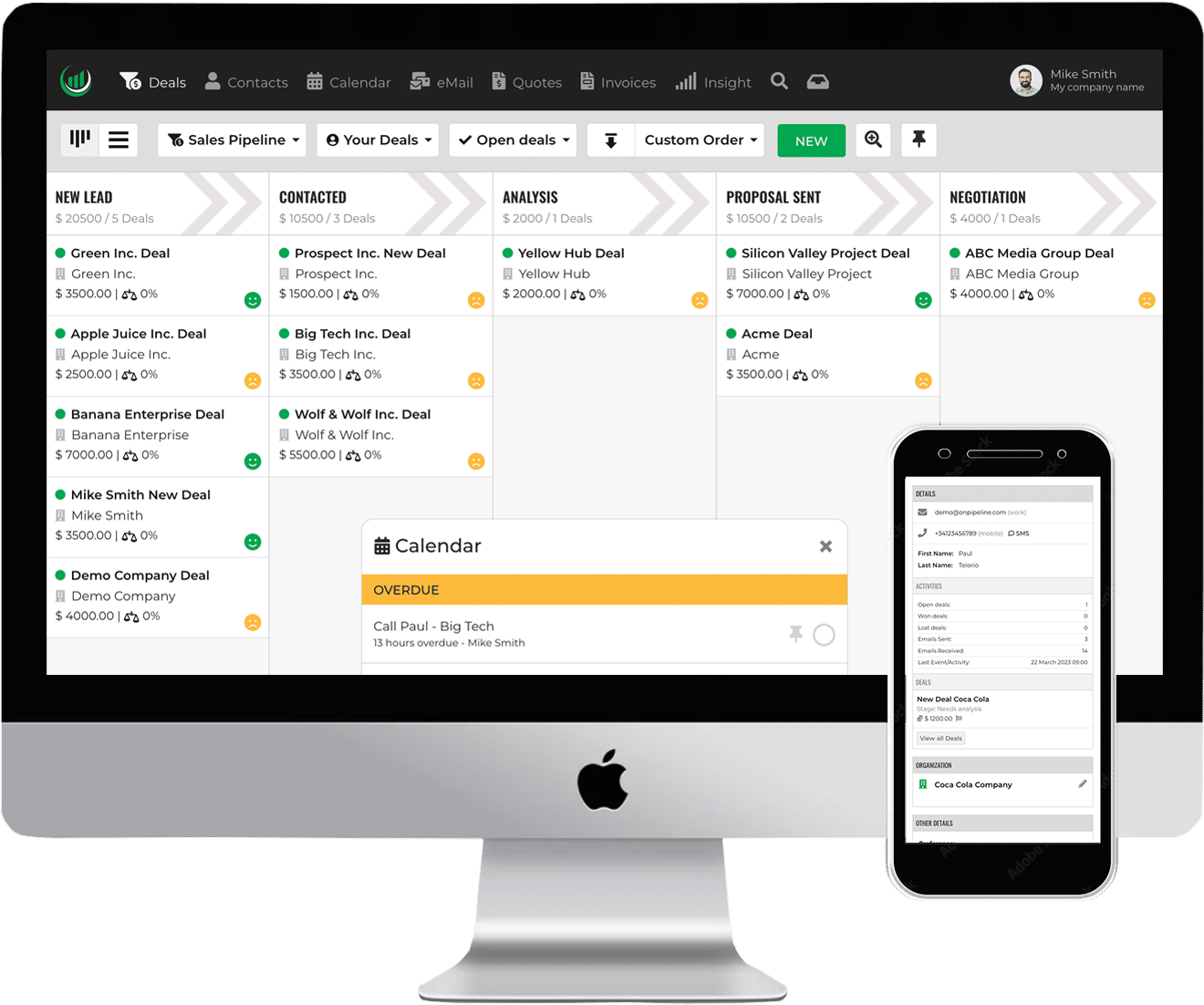This comprehensive guide delves into the distinctions between B2C (Business-to-Consumer) and B2B (Business-to-Business) sales, shedding light on the intricacies that can significantly impact your CRM, pipeline, sales team, and deals.
B2C vs. B2B – An Overview
Let’s begin with a quick glance at the key differences between B2C and B2B sales to provide a clear understanding before we delve deeper into each aspect.
| Aspect | B2C Sales | B2B Sales |
|---|---|---|
| Focus(CRM) | Consumer-centric | Business-centric partnerships |
| Customer Base Size | Vast and diverse | Narrow and targeted |
| Decision-Making Complexity | Relatively straightforward, often emotional | Intricate, rational analysis and consensus |
| Marketing Strategies | Mass-market, brand recognition | Niche-oriented, targeted outreach |
| Sales Cycle Duration | Short and transactional | Protracted and relationship-driven |
| Pricing Structures | Standardized and fixed | Flexible and negotiable |
| Customer Support | Quick issue resolution | Comprehensive, tailored support |
B2C vs. B2B – The difference
While both share the goal of driving revenue, they operate in entirely different dimensions, each with unique challenges, strategies, and dynamics. In this section, we embark on a journey to explore the fundamental differences that set B2C and B2B sales apart. From understanding the diverse customer bases to unraveling the complexities of decision-making and marketing strategies, we’ll delve deep into these two distinct sales domains.
Whether you’re a seasoned sales team professional or a business owner looking to fine-tune your approach, this exploration will equip you with valuable insights to thrive in your chosen sales arena. So, let’s embark on this enlightening journey to uncover the intricacies of B2C and B2B sales.
Personalization vs. Relationship Building
In B2C, CRM systems are engineered to manage vast databases of individual customer profiles. The focus here is on personalization and understanding the intricacies of consumer behavior.
B2C CRM often employs data analytics and segmentation techniques to tailor marketing efforts and product recommendations. These systems are adept at tracking the customer journey, from initial contact to purchase. By harnessing consumer data, B2C businesses strive to enhance the consumer experience, build brand loyalty, and boost repeat sales.
Conversely, in B2B sales, CRM takes on a different role. It revolves around managing relationships with a smaller, high-value clientele. B2B CRM is less about personalization at the individual level and more about building lasting relationships with businesses. It focuses on understanding the unique needs, challenges, and long-term goals of each B2B client.
In this context, CRM systems are instrumental in managing complex pipelines, tracking interactions, and identifying upselling opportunities. Account managers often play a critical role in B2B CRM, serving as the primary point of contact and ensuring that the sales team meets the client’s specific requirements.
Masses vs. Niches
One of the primary distinctions between B2C and B2B sales is their customer base. B2C sales cater to individual consumers, each with their preferences and needs. This often results in a vast and diverse audience, ranging from impulse shoppers to discerning buyers who carefully evaluate their choices.
On the other hand, B2B sales revolve around a narrower, more targeted clientele. In this domain, businesses engage with other businesses, and each client can represent a substantial portion of the company’s revenue. This necessitates a highly personalized approach and a deep understanding of each client’s specific needs and goals.
Decision-Making: Emotions vs. Rational Analysis
Decision-making in B2C and B2B sales varies significantly. In B2C, decisions are often straightforward and influenced by emotions, personal preferences, and immediate needs. Consumers choose based on price, brand appeal, and how a product or service aligns with their lifestyles.
Conversely, B2B decision-making is a complex process that involves multiple stakeholders within the client’s organization. Executives, department heads, procurement teams, and technical experts all have a say in the decisions. These choices are driven by rational analysis, long-term strategic objectives, and the need to align with the company’s goals.
Mass Awareness vs. Targeted
Marketing strategies also diverge between these two sales models. B2C marketing is geared towards creating mass awareness and establishing brand recognition. It often employs broad-reaching channels like social media, television, and print to reach a broad audience.
In contrast, B2B marketing is more specialized and niche-oriented. It involves targeted outreach to businesses that align with the products or services offered. Content marketing, participation in industry events, and professional networking play vital roles in B2B marketing endeavors.
Sales Cycle Duration
The duration of sales cycles varies significantly between B2C and B2B sales. B2C sales cycles are often shorter and transactional, focusing on high sales volume. Consumers make swift purchases, especially in response to limited-time offers or promotions.
In contrast, B2B sales cycles are typically lengthier. They involve building relationships, addressing complex needs, and gaining consensus among various stakeholders. These cycles can span weeks or even months as businesses carefully evaluate their options and ensure long-term goals are aligned.
Short-Term vs. Long-Term
The management of sales pipelines reflects the differences in deal size and sales cycle duration. In B2C sales, the focus is primarily on short-term pipeline management. The aim is to ensure a continuous flow of transactions to sustain business operations.
B2B sales, on the other hand, involve long-term pipeline management. The emphasis is on nurturing leads, building relationships, and strategically advancing deals over an extended timeframe. This approach aligns with the protracted sales cycles and the need to navigate complex decision-making processes within B2B clients’ organizations.
Quantity vs. Value
B2C deals typically revolve around quantity, aiming to secure a high volume of transactions. This is often driven by consumer demand for products and services that are accessible and affordable.
In contrast, B2B deals focus on value. The emphasis is on establishing long-term partnerships that deliver substantial value to both parties. Larger transaction sizes, customizations, and the potential for recurring revenue streams characterize B2B deals. The goal is to create mutually beneficial agreements that contribute to the growth and success of both businesses involved.
Pricing Structures
Another key difference is the pricing structure and customer support. B2C pricing tends to be standardized and fixed, with occasional discounts or promotions to attract consumers.
In the B2B realm, pricing is often flexible and open to negotiation. It is tailored to the client’s specific needs, which may include custom quotes, bulk purchase agreements, and long-term contracts.
Rapid Response vs. Comprehensive Assistance
B2C customer support is characterized by rapid response and efficiency. It’s a world where consumers expect quick issue resolution, often with the click of a button or dialing a toll-free number.
Call centers and online chat support are the frontline troops, ensuring that individual customer problems are swiftly addressed. This agile approach caters to the immediacy of consumer needs, aligning with the impulsive nature of many B2C purchases.
On the other side of the spectrum, in the B2B realm, customer support takes on a different form—a form characterized by comprehensive assistance. Here, it’s about more than just resolving issues; it’s about building lasting relationships. B2B customer support often involves dedicated account managers who are the primary point of contact between the business and its clients. These account managers are well-versed in clients’ needs, goals, and pain points.
Sales Team Dynamics
The composition and dynamics of sales teams in B2C and B2B sales also exhibit noteworthy differences. In B2C sales, sales teams often consist of many representatives focused on transactional interactions. Efficiency and quick sales are paramount, requiring a high volume of customer interactions.
Conversely, B2B sales teams are typically smaller in size and relationship-oriented. They prioritize building and maintaining long-term partnerships with key clients. Relationship-building skills, industry expertise, and navigating complex organizational structures are crucial in B2B sales teams.
Not Exclusive, But Complementary
While we’ve explored the distinctive features of B2C and B2B sales, it’s essential to recognize that these models are not mutually exclusive. Many businesses operate in both domains, leveraging the strengths of each to create a complementary sales strategy.
For example, a B2B company that traditionally caters to business clients might explore direct-to-consumer (D2C) sales to reach a broader audience. Conversely, a B2C company with a strong consumer following might develop B2B partnerships to expand its reach into niche markets.
The key to success in modern sales lies in adaptability and a deep understanding of these distinct sales landscapes. By embracing the diverse demands and dynamics of B2C and B2B sales, businesses can thrive in the ever-changing world of commerce.
In resume
As we conclude this exploration, it’s clear that bridging the gap in sales involves more than just understanding; it demands a commitment to agility, a dedication to customer-centricity, and a willingness to evolve. In this ever-shifting scenario, the ability to seamlessly transition between B2C and B2B approaches can be a defining factor in your sales excellence. So, embrace the diversity of sales, adapt, and thrive in the dynamic world of commerce.


